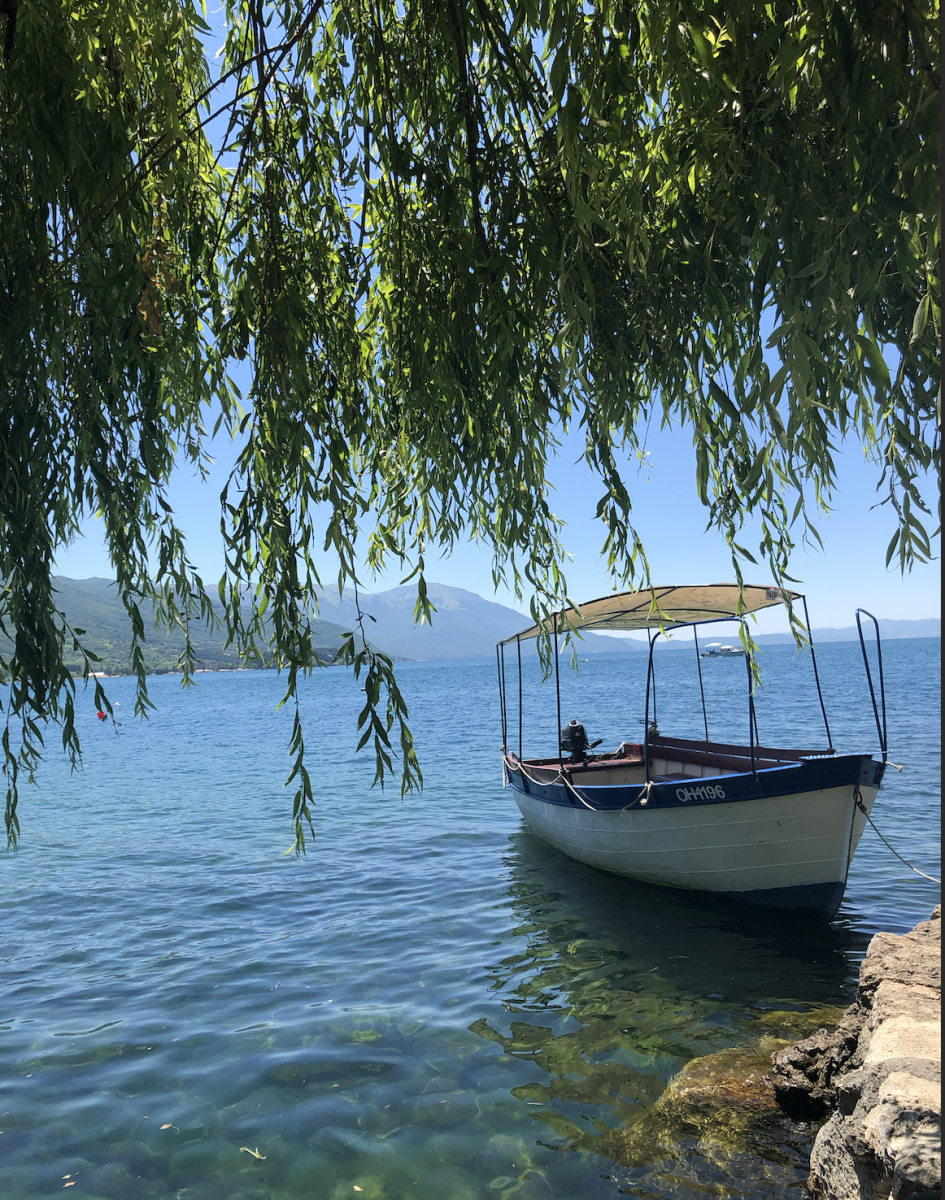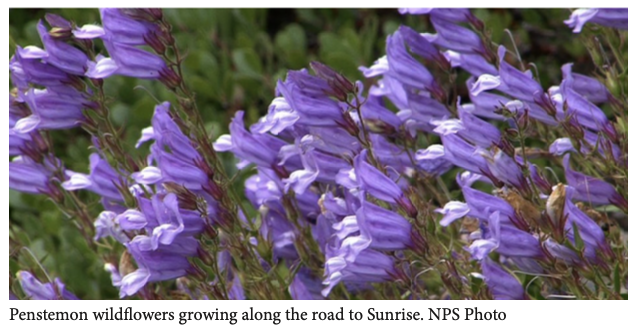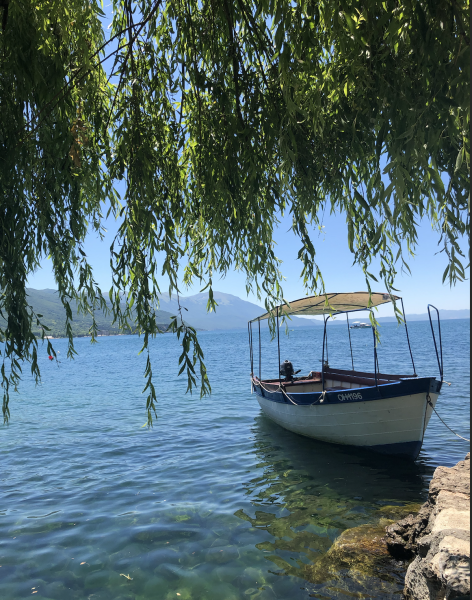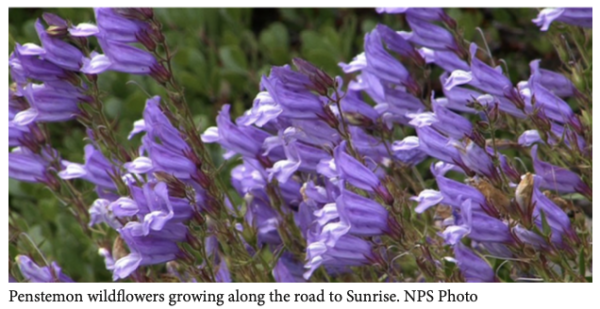Song For the Fire (Short Story Submission)
May 7, 2021
At the edge of the glen, where the trees grow thin and turn to stumps, a tiny cabin sits in knee-high silver grass. A few paces from the cabin’s door, a man sets down a thick clay pot beneath a waterspout. He straightens up and pushes his shoulders back, stretching away the sleep. The bottom half of his face is obscured by a thick beard, and his watery eyes are rimmed with red. The dawn rays brighten against his cheek, casting his face in sharp, drawn lines. He feels the sun’s distant warmth reaching out for skin like fern tendrils, but the icy morning air still stings his nose with each inhale. He gazes out at the hazy morning sky.
Fog blurs the borders between the snowy caps and rocky outcroppings of the blue mountains on the horizon. At the mountains’ sloping feet, lush green leaves and towers of black bark guard the rich earth. There was a time when he thought he could stand and admire the view forever. But now, his eyes are clouded. The mountains, the valley, the forest: they might as well be empty air.
He leans forward and pushes down on the rusted metal of the waterspout. He remembers, as a young boy, heaving on the unyielding lever of the spout in his family’s yard until his thin, pale arms gave out. Back then, he shouted and kicked the thing, nearly breaking his toe. Now, his arms are masses of coiled muscle, his skin turned to leather from countless days laboring under the sun. Pulling water up from the well barely warms him.
He hefts the clay pot against his chest and returns to the cabin, his footsteps shaking the ground as he passes. The air inside the cabin is heavy and stale. A bed just wide enough for two people sits wedged in the corner, covered in thick furs; a fireplace smolders to its left. The whole place has a forgotten air to it: like it’s been left here sleeping, and the man’s return will wake it up. But he disturbs nothing as he wades through the dust. The cabin remains asleep.
He sets down his water pot and shuffles to the table, tracing his finger along the grain, hesitating to pick up the picture sitting there. She is a young woman, her image slightly faded. She’s in the middle of turning to the camera, her eyes just opening after a blink. Her face has a softened blur, like she is an apparition, only captured on film by pure luck. She holds her dark locks back from her face with one hand and clutches a sunhat in the other. A dress billows around her and she smiles, a tiny smile, like she just remembered an old joke.
He doesn’t take his eyes off the photo as he reaches across the table and grabs hold of his flute. He lifts it to his lips and plays one short, hollow note. It fills the cabin quickly, like a cup overflowing with water, and then disappears, every drop evaporated in an instant. The silence collapses back in on him, so quick he wonders if the flute even made noise: if he’d ever really heard music before at all. The silence is heavier than before. He hadn’t thought that was possible. It presses down on his shoulders, dragging at his body as he tucks the flute into his jacket and turns towards the door. Leaning against the door frame is a hefty felling axe. It falls into the palm of his hand as he passes by.
The axe swings alongside his knees as he walks, passing sun bleached stumps scarred from the hacking of metal. Sap oozes from the fresh cuts, bubbling up like golden blood. He keeps his eyes on the ground, unaware of the quiet violence of the desecrated grove. Soon, thin trees appear amongst the stumps, a reminder of the life waiting in the earth. He doesn’t see it. Ferns
spring up around his feet. The trees grow thicker, sturdier. Now the ground is covered in a thick carpet of green, tendrils filled with the nectar of life spilling over the open ground. He still does not see. He cannot see.
His gaze remains on his feet as he passes under the canopy, each step more important, and more difficult, than the last. He doesn’t see the shafts of light dappling the undergrowth. He doesn’t hear the trills and flutters of wings above. He doesn’t notice the swaying of the old oaks, their ancient wood groaning in a forgotten tongue. He stops. Now he stands on the edge of a clearing. The ferns and grass are trampled down here, their blood seeping out into the earth from their fresh breaks. He crosses the clearing in a few strides, his usually heavy footfalls quiet as a fox. He kneels down and bows his head, placing his hands on the branches of the pyre. His lips move noiselessly in recitation. The birds above sing, as if they are praying with him. The blood of the forest soaks into the knees of his pants.
Her body is wrapped in blue linen. He places one hand over her chest, his fingertips brushing the fabric of her shroud. For a moment, the urge to see her face is unbearable. His fingers twitch as he reaches to pull back the cloth, to see her peaceful face, her serene smile- to look into her eyes one more time. He pulls his hand away. It isn’t her face anymore, he reminds himself. Her lips do not smile. Her eyes are clouded with death. He places the axe on top of her chest, gently, as if afraid he might wake her up. The worn metal seems aware this will be its final place of rest; it sinks into her corpse, a key finally finding its mold. He stares at the shape of her face beneath the linen, carving the silhouette into his mind. Terror beings to build in his gut, slowly corrupting his whole body. He stands, frozen, too frightened to look away. He doesn’t want to forget her, but already he is. The slope of her face, the color of her eyes: already it’s fading from his memory, more and more with each passing second. His breathing comes quick as he tries desperately to grasp onto the trailing threads of her voice, her laugh, and secure them in his mind, but it is useless. There are no incorruptible memories: no transcendent dealings with God. The birds do not pray for him- they do not even know their trills are songs. When the forest is cut, it bleeds.
He pulls a piece of flint from his pocket and leans down to the bottom of the pyre. He sits, flint hovering over the striking rock, and stares into the dead moss, brown and gray, its blood long since dried. He sees the flint splitting apart against the stone, the moss growing fresh and damp and green again, once again coursing with the nectar of the forest. The split trunks sprout new saplings, and the pyre is a green throne. She rises, her shroud a cerulean robe, flower petals tumbling down as the axe falls into the palm of her hand.
He is kneeling below the pyre. The sharp, cutting flint. The dead kindling. The wilting flower petals. The bubbling golden blood. The silhouette of her face below the linen, still as death. Fire roars in his belly, and he stabs the rock with his flint. Sparks skitter forward, the kindling smolders and lights. No second try. He tumbles back, falling into the trampled grass, its blood slick against his palms.
Flames lick at the logs, singeing the edges of her robe. He rises to his feet, forcing his legs to hold his weight, although they no longer have the will to do so. His eyes fix on the flames as they rise over her body. He is hollow: all the fire in his belly has been sucked out, stolen by theravenous pyre, the dry kindling aching to burst and crackle and burn. Smoke rises as the flames bite into her body. The birds are silent.
It should not be silent. There must be a song as she is released back into the sky. There must be a song as she is returned back to dust. He pulls the flute from his coat and lifts it to his lips. A low, hollow note rings out from the clearing, like a cup overflowing with water. He does not stop; there will be no heavy, pressing silence to weigh her down as she floats up, up into the sky. The song swirls with the smoke, twirling and dancing. He does not stop, even when he loses her silhouette in the bright, shining blur of his tears. He does not stop, even when the breath catches in his chest and the flute whistles and screeches. He does not stop. He plays as she floats up, her body dancing as smoke in the air, leaving him behind.
Short story by Katherine Christensen. To learn more read the April edition of Inkblots.









